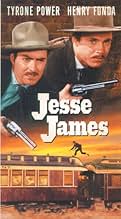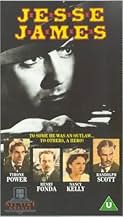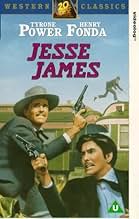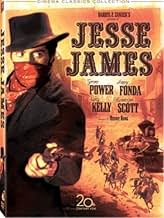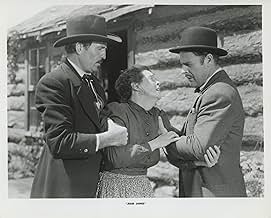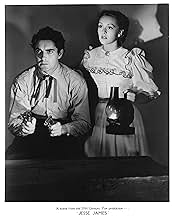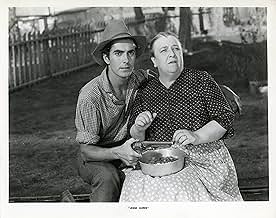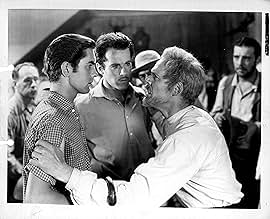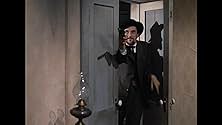El ferrocarril avanza por territorio americano a finales del siglo XIX y la familia James, como muchas otras, es desahuciada para permitir su paso. Los hermanos James se toman la justicia po... Leer todoEl ferrocarril avanza por territorio americano a finales del siglo XIX y la familia James, como muchas otras, es desahuciada para permitir su paso. Los hermanos James se toman la justicia por su mano.El ferrocarril avanza por territorio americano a finales del siglo XIX y la familia James, como muchas otras, es desahuciada para permitir su paso. Los hermanos James se toman la justicia por su mano.
- Dirección
- Guión
- Reparto principal
- Jesse James Jr.
- (as John Russell)
Reseñas destacadas
When Power learned of this, he spent thousands upon thousands of dollars but never located his offspring. Just think, today she'd drag him into court and sell her story to People. But the times were different.
Frankly, I'm not surprised it happened. Even Power's younger daughter Taryn thinks her father was his most devastatingly handsome in Jesse James. She's right.
Darryl F. Zanuck gave his biggest star a first-class production in color no less. Not remarkable considering that Power in 1939 would hit the pinnacle of his popularity, beating Gable in the year of GWTW in box office receipts.
In this version, Jesse is a folk hero who seeks revenge on the railroad for cheating people out of their property and allowing its representatives to resort to violence against the property owners. That's one way of looking at it.
What puts this movie over is the top-notch cast, headed by Power. Critics could never see beyond his looks, and it is difficult, but his Jesse is ruthless, loving, defeated, and angry as the story demands.
Henry Fonda is perfect as Frank James, and the scene between the two men after Jesse argues with the gang is wonderful. One sees Jesse's pain and feels Frank's concern.
The rest of the cast includes Nancy Kelly, Henry Hull, Brian Donlevy, John Carradine, Jane Darwell, and Randolph Scott - all first-rate.
I'm not a particular fan of westerns, but this one held my interest. Of course, it helps when the Jesse is the stuff dreams are made on.
Less so since the courtly southerner Nunnally Johnson wrote and produced the yarn. In reality the James boys took to knocking off banks and trains after being at a loose end following Missouri's joining the losing side in the War Between the States. This was too painful a scab to pick in the Thirties, so Johnson gives the Jameses a more palatable enemy than Abe Lincoln: big bad railroad barons upsetting their ma. And he paints his outlaws with a populist tint, to please New Deal Democrats as well as Dixiecrats who knew the real backstory.
However, the broad outlines of their rise and fall are intact. We see a gradual slide into semi-chivalrous villainy (they didn't rob train passengers, only mails), a 'Liberty Valance'-like exploitation of their coups by political orators and editors, Jesse's becoming consumed by his own legend, and the final botched bank job at Northfield, Minnesota. That leads to a panicky flight and an attempt to live semi-respectably under pseudonyms, followed by Bob Ford's betrayal as Jesse turns art curator.
The film is pleasingly quiet between action set pieces, free of the obtrusive music that was often the curse of Hollywood soundtracks and laced with good lines from Johnson's florid pen. And above all, surrounded by good character actors, we have two rising Zanuck stars tussling enjoyably for mastery, both in the plot and career-wise.
Henry King had become Power's preferred handler ('In Old Chicago' the previous year had been a wow) and both men evidently relish the challenge of tweaking his 'nice bank teller' image a little. Swarthy and bearded betimes, barking out orders to older subordinates, Power does fine. Fonda's grand remonstrance, when he tells Junior that he's turning into a suicidal psycho, is ably played and paced. The soft early tripack Technicolor looks sweet both outdoors-- Ford was getting similar results in 'Drums Along the Mohawk'-- and in candle-lit interiors.
Also noteworthy is Jesse's respectful, confiding relationship with his black ex-slave Pinky (Ernest Whitman) when he decides not to pursue Frank. Black maids could sass their mistresses in crazy comedies, but this quality of understanding between men of different colours was unusual in early-talkie Hollywood.
'Jesse James' was released in Hollywood's peak year, 1939. It's understandable that it was overlooked. But when we've done finger-wagging at the cruelty to horses which led the American Humane Association to demand supervisory privileges over stampedes-- and the cruelty to female Central Casting members which allowed Power to father a child on one-- we can still appreciate a good, workmanlike travesty of outlaw history. As a distortion of the James-Younger saga it has not been surpassed.
the title role at all, but his role as written lacks the complexity some
commentators are insisting upon. Fonda is excellent playing the role that he played over and over the next decade or so. The family scenes are to me very touching. What nobody mentioned is the wonderful locale--actually shot in the Ozarks rather than Simi Valley or the Fox ranch. Having been raised in
Independence, Mo and growing up on the James boys legends, this is a major
plus over other versions, and I think the movie is a triumph. Those who don't find fault with it because it isn't made according to today's standards of
film-making style should enjoy it thoroughly. That said, my own favorite James movie is The Long Riders, especially thanks to the incomparable Carradines.
Following closely is The Great Northfield Minnesota Raid, an even loonier
distortion of history, but eminently satisfying!
¿Sabías que...?
- CuriosidadesAfter the two horses that were blindfolded and forced to go over a cliff were killed, a new rule was enforced and later endorsed by The Humane Society of America in which strict standards were created to protect animals. Productions that met the standards of the Humane Society were allowed to add "No Animals Were Harmed or Injured in the Production of this Film" to the end credits. Eventually all the studios agreed that films involving any animals must have present a representative of The Humane Society to ensure that all animals are treated humanely and given a safe environment in which to work.
- PifiasThe movie shows a bomb killing Frank and Jesse's mother. In reality, the bomb thrown through the window by the Pinkerton agents killed their little brother and seriously wounded their mother, who survived although she lost an arm in the explosion.
- Citas
[last lines]
[about Jesse James]
Major Rufus Cobb: He was one of the doggonedest, gawl-dingedest, dad-blamedest buckaroos that ever rode across these United States of America!
- Créditos adicionalesOpening credits prologue: After the tragic war between the states, America turned to the winning of the West. The symbol of this era was the building of the trans-continental railroads.
The advance of the railroads was, in some cases, predatory and unscrupulous. Whole communities found themselves victimized by an ever-growing ogre - the Iron Horse.
It was this uncertain and lawless age that gave to the world, for good or ill, its most famous outlaws, the brothers Frank and Jesse James.
- Versiones alternativasAll UK versions were cut by 13 secs by the BBFC to remove footage of horse-falls including the controversial scene of a horse fatally falling from a cliff.
- ConexionesEdited into Myra Breckinridge (1970)
- Banda sonoraThe Battle Cry of Freedom
(1862) (uncredited)
Written by George Frederick Root
Played by the band at the railroad station
Selecciones populares
- How long is Jesse James?Con tecnología de Alexa
Detalles
Taquilla
- Presupuesto
- 1.600.000 US$ (estimación)
- Recaudación en todo el mundo
- 3444 US$
- Duración
- 1h 46min(106 min)
- Color
- Relación de aspecto
- 1.37 : 1



